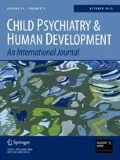Abstract
An examination of a hypothesized relationship between maternal stress experienced during pregnancy and the birth of children who later develop early infantile autism revealed that mothers of autistic children were found to have experienced significantly more family discord and to have had significantly more diagnosed psychiatric problems than mothers of normal children.
Similar content being viewed by others
References
Little W: On the influence of abnormal parturition, difficult labors, premature birth, and asphyxia neonaturum on the mental and physical conditions of the child, especially in relation to deformities.Transac of the Obstet Soc of London 3:293, 1861.
Lipsitt LP, Field TM:Infant Behavior and Development: Perinatal Risks and Newborn Behavior. Norwood, NJ, Ablex Publishing Corp., 1982.
Joffee, JM:Prenatal Determinants of Behavior. London: Pergamon Press, 1969.
Drillien CM: A longitudinal study of the growth and development of prematurely and maturely born children. VII. Mental development at 2–5 years.Arch Dis Child 36:233–240, 1961.
Howard J, Parmelee A, Kopp C, Littman M: A neurological comparison of preterm and full-term infants at term conceptual age.J Ped 88:995–1002, 1976.
Kitchen W, Richards M, Ryan A, McDougall T, Billson E, Keir E, Naylor T: A longitudinal study of very low birthweight infants. II: Results of controlled trial of intensive care and incidence of handicaps.Dev Med Child Neurol 21:582–589, 1977.
Littman B, Parmelee A: Medical correlates of infant development.J Ped 80:509–512, 1978.
Lubchenco L, Delivoria-Papodopoulos M, Searls D: Long-term follow-up studies of prematurely born infants. II: Influence of birth weight and gestational age on sequelae.J Ped 80:509–512, 1972.
Parmelee A, Michaelis R: Neurological examination of the newborn, inExceptional Infant: Studies in Abnormalities, Vol 2, Hellmuth J (Ed). New York, Brunner/Mazel, 1971.
Davies PA, Stewart AL: Low-birthweight infants: Neurological sequence.Brit Med Bull 31:86–92, 1975.
Graziani LJ, Weitzman ED, Velasco MS: Neurologic maturation and auditory evoked responses in low birthweight infants.Ped Clin N Amer 17:1015–1037, 1970.
Klaus MH, Kennel JH: Mothers separated from their newborn infants.Ped Clin N Amer 17:1015–1037, 1970.
Klaus MH, Jerauld R, Kreger N, McAlpine W, Steffa M, Kennel JH: Maternal attachment importance of the first post-partum days.The New England J Med 286:460–463, 1972.
Leiderman P, Leifer A, Seashore M, Barnett C, Grobstein R: Mother-infant interaction: Effects of early deprivation prior experience and sex of the infant.Research Publications of the Assoc Res Nerv Ment Dis 51:223, 1973.
Laney MD, Sandler HM: Relationships among maternal stress, infant status and mother-infant interactions, inInfant Behavior and Development: Perinatal Risk and New Behavior, Lipsitt LP, Field TM (Eds). Norwood, NJ, Ablex Pub. Corp., 1982.
Gunter L: Psychopathology and stress in the life experiences of mothers of premature infants.Am J Obstet Gyn 86:333–340, 1963.
Ward AJ: The effect of maternal anxiety and difficult pregnancies upon the fetal and later development of autistic and autistic-like children, inChildhood Autism and Structural Therapy, Chapter 9, Ward AJ. Chicago: Nelson-Hall, 1976.
Gorsuch RL, Kay MK: Abnormalities of pregnancy as a function of anxiety and life stress.Psychom Med 36:352–362, 1974.
Holmes T, Rahe R: The social readjustment scale.J Psychosom Med 11:213–218, 1967.
Stott DH, Latchford SA: Prenatal antecedents of child health, development, and behavior.J Am Acad Child Psychiat 15(1):161–191, 1976.
Nuckolls KB, Cassell T, Kaplan BH: Psychosocial assets, life crisis and prognosis of pregnancy.Am J Epidem 95:431–441, 1972.
Selye H:The Stress of Life. New York, McGraw-Hill, 1956.
Stott, DH: Follow-up study from birth of the effects of prenatal stresses.Devel Med & Child Neurol 15:770–787, 1973.
Ward AJ: Prenatal stress and childhood psychopathology.Presented at meeting of American Orthopsychiatric Association in New York, N.Y. on April 13–16, 1977.
Author information
Authors and Affiliations
Additional information
Data was gathered for this paper while author was a member of the Department of Psychiatry and Human Behavior at the Thomas Jefferson Medical School in Philadelphia, Pennsylvania.
Rights and permissions
About this article
Cite this article
Ward, A.J. A comparison and analysis of the presence of family problems during pregnancy of mothers of “autistic” children and mothers of normal children. Child Psych Hum Dev 20, 279–288 (1990). https://doi.org/10.1007/BF00706020
Received:
Revised:
Accepted:
Issue Date:
DOI: https://doi.org/10.1007/BF00706020


